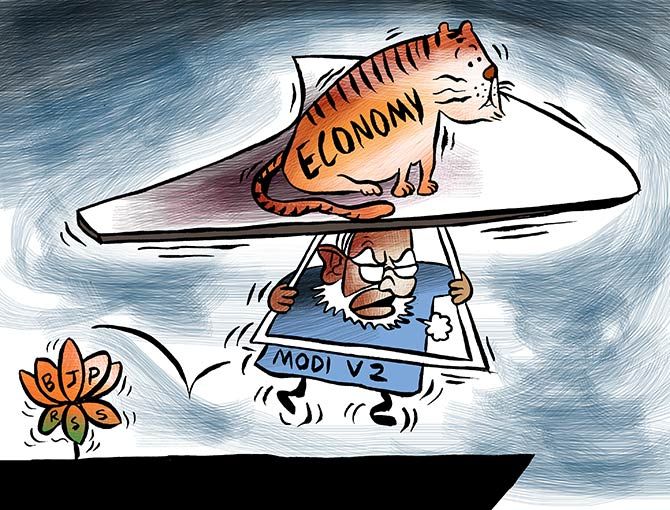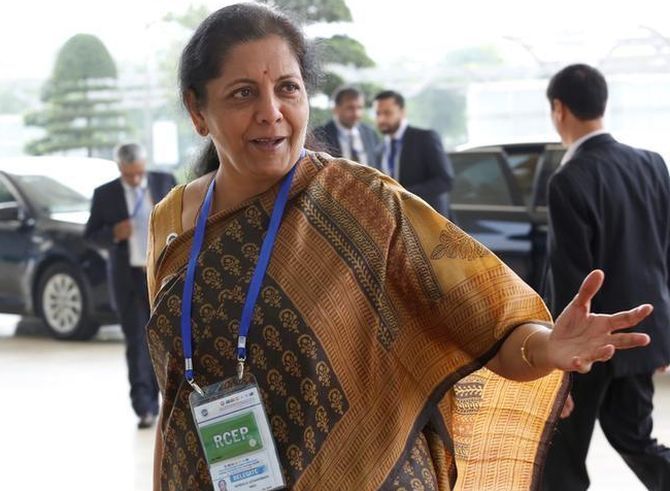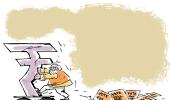'I have been saying for the last 25 years, to no avail naturally, that the only government asset that is politically unproblematic is land,' says T C A Srinivasa Raghavan.
Illustration: Uttam Ghosh/Rediff.com

Towards the end of the second decade of the 20th century, two events occurred, leading to the creation of modern macroeconomics.
One was the Communist revolution in Russia in 1917; the other was the end of the Great European War in 1918.
The overall consequence of these two events was a huge depletion of European capital by 1920, which till then had financed global economic growth.
All European governments were virtually bankrupt in 1920.
America, however, prospered because European capital had found its way to New York.
The Americans, however, didn't know how to deal with so much money.
So they went into a decade-long binge-and-boom, which ended in bust in October 1929.
As a result, by the end of 1930 all major Western economies had gone bust.
In the 1930s, therefore, in the face of the Communist threat and the economic disaster, two broad strands of macroeconomic thought emerged.
One was due to John Maynard Keynes, who, in 1936, said governments had what amounted to a moral duty to spend money -- even if they didn't have it -- to put cash into people's pockets.
This would increase aggregate demand and put some wind into the sails of the stalled economic boats.

Fisher's diagnosis
The other strand was less political.
It was due to a now virtually forgotten but very great thinker called Irving Fisher.
He said credit booms were inevitably followed by a bust because the real value of the debt went up when prices and incomes fell precipitously due to excesses of different kinds.
So, when debts don't get repaid, banks go bust.
When banks go bust, credit dries up.
When credit expansion declines, the economy slows.
When the economy slows, incomes and prices fall.
And so on in an expanding circle.
The best way to tackle this problem, he said, was to somehow get the real value of the debt back to the (lower) level at which it was contracted.
The problem, of course, was how to do this: By debt relief or by 'fiscal stimulus', a la Keynes.
The former didn't appeal to the bankers, but the latter appealed hugely to the politicians.
Typically, they said let's do both, and that is what the world has been doing since about 1970.
India, in particular, has emerged as a world champion in this.
Its politicians have been unctuously writing off debt and exuberantly pumping in money.
Some of both has stuck to their fingers.
When the music stops
But now the money pump has seized up and debt relief has reached its limits.
Like the European governments a hundred years ago, the Indian government is very broke.
As the saying goes, 'Na rahega paisa, na bajega baja'.
Narendra Damodardas Modi's boat is not only stuck in the doldrums, it is also taking on water.
The new finance minister can look at the sky and wait -- or do something completely new to put the wind back into the sails of the economy.
The question is what.
I have been saying for the last 25 years, to no avail naturally, that the only government asset that is politically unproblematic is land.
Unlike with the public sector enterprises, labour doesn't come embedded in it.
It is, therefore, easy to sell or lease.
But it won't.
For example, in south and central Delhi, it is re-developing almost a thousand acres for its employees who will pay around 10 per cent of their basic salaries as rent, amounting to perhaps ~5 crore a year.
It has thus frozen the value of that land instead of unlocking it.
If it had sold it to builders -- like Donald Trump, say, because Indian builders are broke -- its fiscal problems would have vanished for at least a decade if not more.
My bureaucrat friends tell me they have blocked the idea in the past -- one defence minister had thought about selling military land -- because of corruption fears.
But it is different now.
Whatever else the prime minister is accused of, corruption is not one of them.
That is why he must set up the equivalent of a divestment commission, a sort of Treuhandanstalt if you like, to identify which of its land can be redeveloped, not just in Delhi but all over India.
Treuhandanstalt, or trust agency, was the body set up by the East German government in 1990 to supervise the privatisation of the public sector.
All other avenues are closed.
Neither Keynes not Fisher can come to the rescue.












 © 2025
© 2025